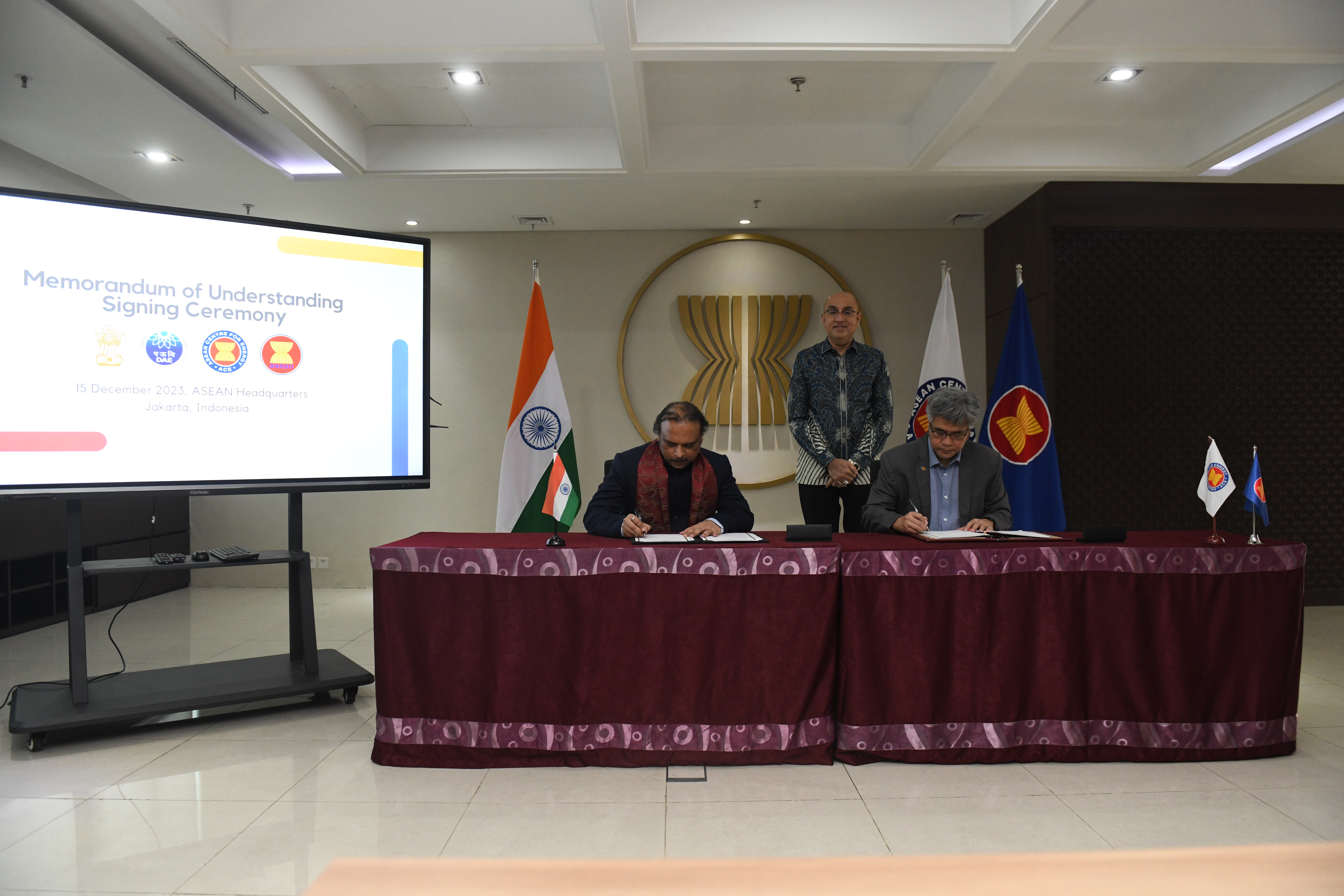Menu

Photo 1. (left-right) H.E. Jayant N. Khobragade, Ambassador of India to ASEAN, H.E. Satvinder Singh, Deputy Secretary-General of ASEAN Economic Community, and Dr Nuki Agya Utama, Executive Director of ASEAN Centre for Energy
Jakarta, 15 December 2023 – In a significant development today, the ASEAN Centre for Energy (ACE) and the Global Centre for Nuclear Energy Partnership (GCNEP) formalised a five-year Memorandum of Understanding (MoU) aimed at advancing the goals outlined in the ASEAN Plan of Action for Energy Cooperation (APAEC) Phase II: 2021-2025. The MoU signing took place at the ASEAN Headquarters in Jakarta, Indonesia, between Dr Nuki Agya Utama, Executive Director of ASEAN Centre for Energy and H.E. Jayant N. Khobragade, Ambassador of India to ASEAN. The signing ceremony was witnessed by H.E. Satvinder Singh, Deputy Secretary-General of ASEAN Economic Community for 2021-2024.
Dr Nuki Agya Utama expressed optimism about the collaboration’s potential to address energy challenges within the ASEAN region. He said, “The MoU with GCNEP will concentrate on the programme area 7 on Civilian Nuclear Energy of APAEC Phase II. This strategic focus is directed towards enhancing both regulatory and technical capacities in the realm of nuclear energy, fostering greater public comprehension of nuclear power generation within the ASEAN region, and fortifying regional collaboration on nuclear energy initiatives. Undoubtedly, nuclear energy stands as a clean energy source capable of addressing the growing energy needs of the ASEAN region.”
H.E. Jayant N. Khobragade followed up with much enthusiasm on the collaboration. He said, “The GCNEP-ACE partnership is hoped to contribute to the energy landscape in ASEAN, with a focus on sustainable nuclear energy solutions.” The Ambassador highlighted the peaceful uses of nuclear energy and technologies developed by India’s Department of Atomic Energy in the field of agriculture, health, other industrial applications, which could be of interest to the ASEAN.
According to the 7th ASEAN Energy Outlook, nuclear energy emerges as a key clean energy source capable of meeting the growing energy needs of the ASEAN region. The strategic alignment with APAEC’s regional objectives in the power sector is projected to deploy around 5.2 GW of nuclear power plants in the 2040s, offering higher energy content and lower cost for electricity generation.
The MoU is in line with the priorities of the ASEAN Member States and India to pursue cooperation on alternative energy sources of civilian nuclear energy and clean energy to ensure energy security for the current and future generation as per the Joint Statement on ASEAN-India Comprehensive Strategic Partnership and Annex to the ASEAN-India Plan of Action (2021-2025).
The MoU shall facilitate cooperation on advanced nuclear energy systems, nuclear security and physical protection systems, nuclear safety, applications of radioisotopes and radiation technologies, radiation protection and environmental radiation monitoring and other mutually agreed areas. The desired goals will be achieved by organising joint research, lectures, seminars and workshops.
About ASEAN Centre for Energy (ACE)
Established on 1 January 1999, the ASEAN Centre for Energy (ACE) is an intergovernmental organisation within the Association of Southeast Asian Nations’ (ASEAN) structure that represents the 10 ASEAN Member States’ (AMS) interests in the energy sector. ACE supports the implementation of the ASEAN Plan of Action for Energy Cooperation (APAEC), a blueprint for better collaboration towards upgrading energy. The Centre is guided by a Governing Council composed of Senior Officials on Energy from each AMS and a representative from the ASEAN Secretariat as an ex-officio member.
The three key roles of the ACE:
Keeping the region’s improvement, sustainable and harmless to the ecosystem is a fundamental concern of the ASEAN energy sector.
Hosted by the Ministry of Energy and Mineral Resources of Indonesia, ACE’s office is located in Jakarta, Indonesia.
Media contact:
For media inquiries, please contact:
[email protected]
Communications Team
Corporate Affairs Department
